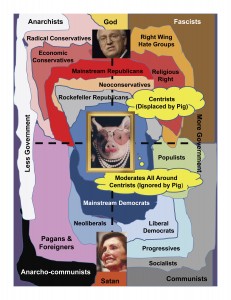
Inside front cover of Robert Steele, ELECTION 2008: Lipstick on the Pig (EIN, 2008).
This is where plain JPEGs are placed for public use as desired, under Creative Commons copyright with commercial restriction.

Inside front cover of Robert Steele, ELECTION 2008: Lipstick on the Pig (EIN, 2008).
Talk of wealth from minerals by US geologists and Pentagon personnel add to the darkening view that those involved in war, corruption and disregard for the people of Afghanistan (and sacrificed soldiers + more to be sacrificed) will prosper…
+ Opium = supplies 90% of crop source for heroin (president Karzai's brother links to heroin trade)
+ Hashish = April 2010 report: Afghanistan Hashish, (not only opium) Declared World’s Largest Producer

+ Minerals = US geologists, Pentagon, Indian firms claim 1-3 trillion dollar value of mineral wealth in Afghanistan
and “Afghanistan's resources could make it the richest mining region on earth” and more importantly, this being ‘known' in 2007. (direct: USGS link) and that the Soviets were aware of mineral wealth during their Afghanistan occupation.
+ Gas Pipeline attempts = 1998 Congressional record related to Unocal/U.S. interests in Central Asia & November 2001 Asia Times article about the book “Bin Laden, la verite interdite (Bin Laden, the forbidden truth)” mentioning the US government's main objective in Afghanistan was to consolidate the position of the Taliban regime to obtain access to the oil and gas reserves in Central Asia.

BBC in 2002 mentions Unocal (Unocal.com is now Chevron.com) and others abandoning pipeline plans due to U.S. missile attacks in 1999. Reports on Enron attempts to make a deal with the Taliban (this 2002 CounterPunch article too). Encyclopedia of Earth also has a short mention of this topic
+ HistoryCommons.org Unocal profile timeline on their Central Asia activities
+ HistoryCommons.org timeline of president Karzai (election organized by the United Nations).
+ Corruption in Afghanistan = Transparency International ranks Afghanistan 179th of 180 countries. And Afghan corruption has doubled since 2007 (IntegrityWatch survey).
Pre-existing plan to attack Taliban before 9/11 was even posted in the BBC and a variation of this was posted at MSNBC in 2002.
“To be truthful about it, there was no way we could have got the public consent to have suddenly launched a campaign on Afghanistan but for what happened on September 11”
-Tony Blair (London Times, 7/17/02)
originally at http://www.timesonline.co.uk/article/0,,2-358038,00.html but no longer at that URL
Related:
+ Karzai Aide in Corruption Inquiry Is Tied to C.I.A. (Aug 26, 2010)
+ Corruption Suspected in Airlift of Billions in Cash From Kabul (WSJ: June 25, 2010)
+ Event Report: 20 Nov 09 NYC, Counterinsurgency–America’s Strategic Burden
+ (Book) Taliban: Militant Islam, Oil and Fundamentalism in Central Asia by Ahmed Rashid – Mar. 1, 2001
+ Afghan War Diaries Explorer
+ UN/World Bank Afghanistan Drug Industry Report (2006)
+ SourceWatch: Opium economy in Afghanistan
+ GlobalSecurity.org: Afghanistan Opium cultivation
+ Wkipedia: Trans-Afghanistan Pipeline
+ Free Book: “The Politics of Heroin in Southeast Asia by Alfred W. McCoy“

Phi Beta Iota: STRONG ANGEL was the other major innovation besides CATALYST, Analysis 2000, and MCIA JNID. Below is Round II from STRONG ANGEL, with Round II from M4IS2 soon to be made public, built around SILOBREAKER (actually, Son of SILOBREAKER). We considered forcing visits to the Synergy Strike Force home page, but decided that the richness of the content there needed to be displayed here.
I. Introduction
Welcome to the MESS-KIT wiki: Minimum Essential Software Services for Knowledge and Information Transfer
II. Structure
The MESS-KIT system is composed of three basic components — the software package, the virtual environment and the hardware:
a. APPLICATION SOFTWARE PACKAGE: One or more Virtual Machine Instances that package together an operating system with a web server environment and all free-and-open-source/commercial-off-the-shelf software modules. Example: A VMware instance of an Ubuntu Linux installation with a full LAMP web server hosting environment and associated web software.
b. VIRTUAL MACHINE CLIENT SOFTWARE: One Virtual Machine Software Client to package, distribute, and host one or more Application Software Packages and abstract the application software from the host operating system. Examples: VMWare Fusion and Sun VirtualBox.
c. HARDWARE: Hardware on which the Virtual Machine Client Software and Application Software Package will run. The Hardware will include a host operating system. Examples: MacMini running OSX, ASUS eeePC Netbook running eeeBuntu Linux.
Continue reading “Handbook: Synergy Strike Force, Dr. Dr. Dave Warner, Round II”

Global Traffic Map 2010
The Global Traffic Map depicts voice traffic flows on the world’s largest international calling routes. Accompanying figures and tables provide valuable insight into regional traffic flows, price and revenue trends, top calling destinations, the impact of mobiles on the international voice market, and the scale of Skype.
Cell Phones & Cancer: New Report Sends Mixed Messages
A new study from Interphone, a study group within the , a segment of the World Health Organization, says there is no increased risk of brain cancer from cell phone use … but then seems to waiver a bit in its position. When it comes to adults, an increased risk of brain cancer is not established…
 My good friend Marshall Auerback analyzes the currency/debt crisis in in EU, and explains why this creates a situation fundamentally different from that facing nations with sovereign currencies. like Britain, Japan, and United States. It is a distinction that needs to be kept in mind, if the US is have a constructive fiscal policy.
My good friend Marshall Auerback analyzes the currency/debt crisis in in EU, and explains why this creates a situation fundamentally different from that facing nations with sovereign currencies. like Britain, Japan, and United States. It is a distinction that needs to be kept in mind, if the US is have a constructive fiscal policy.
Marshall also concludes that the crisis in the Euro will not be fixed by the recently approved bailout to Greece, because there is a fundamental flaw at the heart of the EU design. His analysis leads to the following conclusion: By establishing a common currency, the individual countries have sacrificed independent monetary policy to a supranational monetary authority. This obviously sacrificed monetary autonomy, but it also paralyzed each country's ability to run counter-cyclical fiscal policies. The only way out of the trap would be (1) to set up a supranational fiscal agency (in effect, with each member giving up de jure fiscal autonomy and placing each country's counter cyclical policy powers under the supreme power of a supranational fiscal agency — in effect reducing each nation's economic sovereignty to a level similar to that held by a state in the United States, or (2) or by getting out of the euro and going back to some arrangement like that of the EU prior to the adoption of the Euro — an arrangement which, readers should remember, led to enormous progress.
Auerback does not examine the political implications of Option 1 (hopefully he devote his prodigious analytical talents to this question in future), but it seems to me that, given the history of nationalism and cultural differences in Europe, Option 1 might lead to political situation somewhat similar to, if not as extreme as, that of Yugoslavia, before it disintegrated in the 1980s. The relatively rich republics of Yugoslavia (Slovenia and Croatia) resented policies that transferred of wealth to the relatively poorer republics, like Serbia, Macedonia, Montenegro, or the autonomous region of Kosovo. Once Tito's organizing genius disappeared, the linkages stitching the country together became frayed and eventually snapped as old grievances manifested themselves in newer forms. The same type of evolution could happen to the Europe Union if it underwent a supranational fiscal union, where the rich countries feel they are being unfairly burdened — the beginnings of which are already in evidence.
The great achievement of the EU has been to reduce the probability of violent nationalist conflict among some of its members to a vanishingly small probability while improving the economic lot of its members. Most of this reduction in the propensity toward violence and economic growth took place before the adoption of the Euro. It may be that giving up the Euro is the wiser alternative in the long run, unless someone can synthesize some kind of third option.
CS.
Repeat After Me: the USA Does Not Have a ‘Greece Problem’
Friday, 05/14/2010 – 11:13 am by
NewDeal 2.0
http://www.newdeal20.org/2010/05/14/repeat-after-me-the-usa-does-not-have-a-greece-problem-10863/Marshall Auerback